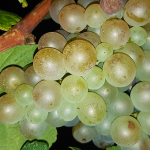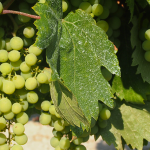


On Saturday 15th of September, it was the right time to harvest manually our red Garnacha. A grape variety of medium-early maturation that stands out for its great capacity of resistance to extreme temperatures and adaptation to poor soils.
A very versatile variety that confers good body and primary aromas such as wild fruits, roasted nuts and black cherries, features that will be the protagonists of our future wines and cavas.
This year, Penedès verified a more Atlantic climatology than a Mediterranean one, with the consequent problems related to this situation. Mildew, the disease most feared by vine growers who work in the vineyards near the sea, was the most dangerous problem in the DO Penedès. As regards our Lacrima Baccus winery, we rejected part of the production to continue guaranteeing the same level of quality and high standards to our consumers, an indisputable priority of our company.
The rains of February and, especially of March, marked the microclimate of Penedès. The spring temperatures were lower than usual and this became an advantage, slowing down the spread of the disease. The mildew moved silently without showing its typical signs and, as soon as it had occasion, attacked with severity.
Acting quickly, our team was able to extinguish the plague by carrying out a proper planning of the phytosanitary treatments and intense work of vegetation management.
The time of the harvest of the Garnacha have been decided based on phenolic maturation, so we opted for these dates and for a cool and endless night for our team of technicians, who works frantically. This image of industriousness will remain engraved on our heads; it seemed that there was a multitude of ants striving uninterruptedly in groups so that everything went as well as possible. The work of a year played an important role in this moment and only as a team and with an adequate planning of the tasks, we can achieve the optimal results expected.
Next weekend, around 22nd of September, it is planned to begin the collection of the Parellada, of later maturation. A variety whose cluster is very large, with very marked shoulders, homogeneous berries and whose primary aromas are fruity notes of white fruit, highlighting the citrus and floral touches. As usual, the collection will be done manually and at night, in this way, thanks to the low temperatures, the fermentation does not start without our control.

Harvest means trembling leaves tending to the colors of autumn, golden or orange colors and hearts hunched and hopeful. With the beginning of autumn and the first rains, the moist soil mixes its aromas with the aromas of ripe grapes. The wind sweeps great white clouds, which contrast with the intense blue sky. The atmosphere is cheerful; the harvest is a tradition that is repeated every year, with the unaltered peasant spirit, typical of our region.
2018 has been a rainy year especially in spring, more specifically in the month of March, where the data mark a high rainfall. From the agronomic point of view, the development of the vineyards, initiated under the best auspices, was conditioned by a strange climate that altered the frosts, the rains and the humidity. Therefore, it will be the year in which the capacity of our winemaker will make a difference in the result.
The recent lowering of temperatures has helped to increase the good quality of the grape and its maturation, after a long period of excessive heat. This has allowed the ripening cycle to slow down to ensure a good harvest development.
Due to the weather conditions that our vineyards have suffered, a reduction in the harvest is expected, which will not affect the quality. In fact, the grape enjoys a great balance between freshness and maturity. The phytosanitary status is optimal and we hope that by dedicating the appropriate efforts and pampering each grain of the cluster with the same affection, we will obtain excellent wines and cavas. The harvest, which began on August 11th, seems definitely better than last year, where the drought had staged the entire vintage.
Recent Comments